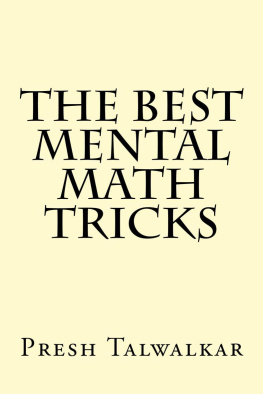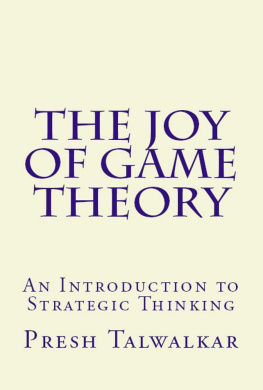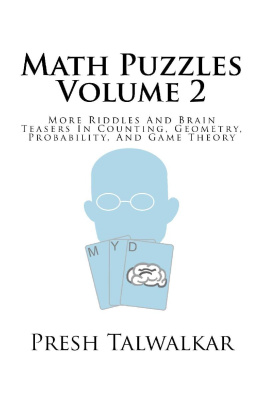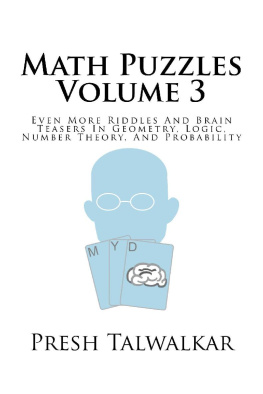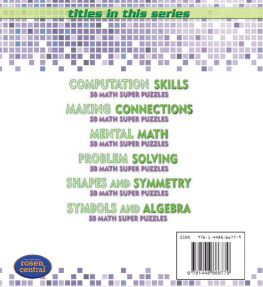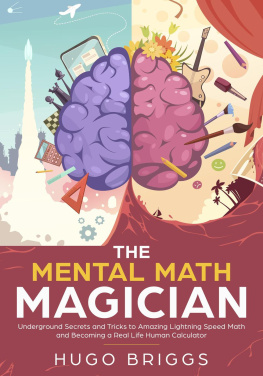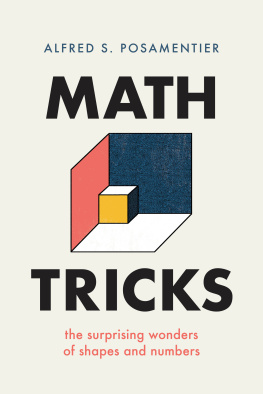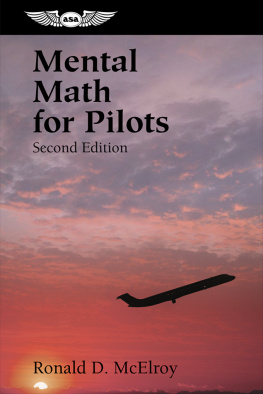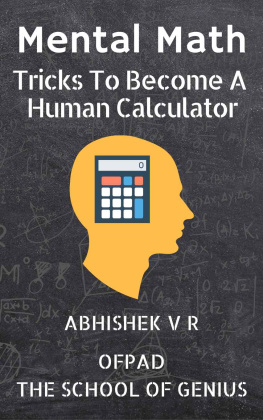Presh Talwalkar - The Best Mental Math Tricks
Here you can read online Presh Talwalkar - The Best Mental Math Tricks full text of the book (entire story) in english for free. Download pdf and epub, get meaning, cover and reviews about this ebook. year: 2015, genre: Children. Description of the work, (preface) as well as reviews are available. Best literature library LitArk.com created for fans of good reading and offers a wide selection of genres:
Romance novel
Science fiction
Adventure
Detective
Science
History
Home and family
Prose
Art
Politics
Computer
Non-fiction
Religion
Business
Children
Humor
Choose a favorite category and find really read worthwhile books. Enjoy immersion in the world of imagination, feel the emotions of the characters or learn something new for yourself, make an fascinating discovery.
- Book:The Best Mental Math Tricks
- Author:
- Genre:
- Year:2015
- Rating:5 / 5
- Favourites:Add to favourites
- Your mark:
- 100
- 1
- 2
- 3
- 4
- 5
The Best Mental Math Tricks: summary, description and annotation
We offer to read an annotation, description, summary or preface (depends on what the author of the book "The Best Mental Math Tricks" wrote himself). If you haven't found the necessary information about the book — write in the comments, we will try to find it.
The Best Mental Math Tricks — read online for free the complete book (whole text) full work
Below is the text of the book, divided by pages. System saving the place of the last page read, allows you to conveniently read the book "The Best Mental Math Tricks" online for free, without having to search again every time where you left off. Put a bookmark, and you can go to the page where you finished reading at any time.
Font size:
Interval:
Bookmark:
Copyright Presh Talwalkar
About The Author
Presh Talwalkar studied Economics and Mathematics at Stanford University. His site Mind Your Decisions has blog posts and original videos about math that have been viewed millions of times.
Books By Presh Talwalkar
The Joy of Game Theory: An Introduction to Strategic Thinking . Game Theory is the study of interactive decision-making, situations where the choice of each person influences the outcome for the group. This book is an innovative approach to game theory that explains strategic games and shows how you can make better decisions by changing the game.
Math Puzzles Volume 1: Classic Riddles in Counting, Geometry, Probability, and Game Theory . This book contains 70 interesting brain-teasers.
Math Puzzles Volume 2: What do an Infinite Tower, a Classic Physics Puzzle, and Coin Flipping Have in Common? This is a follow-up puzzle book with 45 delightful puzzles.
But I only got the soup! This fun book discusses the mathematics of splitting the bill fairly.
40 Paradoxes in Logic, Probability, and Game Theory. Is it ever logically correct to ask May I disturb you? How can a football team be ranked 6th or worse in several polls, but end up as 5th overall when the polls are averaged? These are a few of the thought-provoking paradoxes covered in the book.
Multiply By Lines . It is possible to multiply large numbers simply by drawing lines and counting intersections. Some people call it how the Japanese multiply or Chinese stick multiplication. This book is a reference guide for how to do the method and why it works.
Why Learn Mental Math Tricks?
Mental math has a mixed reputation. Some consider it useless because calculators and computers can solve problems faster, with assured accuracy. Additionally, mental math is not even necessary to get good grades in math or to pursue a professional math career. So what's the point of learning mental math and math tricks anyway?
There are many reasons why mental math is still useful. For one, math skills are needed for regular tasks like calculating the tip in a restaurant or comparison shopping to find the best deal. Second, mental math tricks are one of the few times people enjoy talking about math. Third, mental math methods can help students build confidence with math and numbers.
Mental math tricks are fun to share. Imagine your friend asks you to multiply 93 and 97, and before they can type it into a calculator, you can figure out the answer in your head. Or imagine your friend asks you to divide 17 by 91, and you can calculate out the exact decimal answer in your head. Mental math tricks are impressive to see and they can be exciting to learn.
Mental math reduce the chore of simple math, build confidence in math skills, and serve as educational entertainment at parties and pubs. The flip side is some mental math calculations require extensive memorization and lots of practice to learn. This book is therefore not a comprehensive collection of mental math methods. This book seeks the middle ground: tricks that are relatively easy to learn, are fun, or have educational value.
Each section explains a math trick, and then has practice problems with complete solutions to illustrate the method. Every method is accompanied with a mathematical proof to justify why the trick works. While I find the proofs the most interesting parts, they can be skipped without detriment to learning the methods. The book can be read from start to finish. Or you can skip around, as most sections are independent of each other, excluding a few tricks that build upon previous ones.
Part I: Introductory Tricks
Calculate Percentages
While you can use a calculator to figure out percentages, there is a simple method you can use to solve them in your head. The best part is you probably are familiar with the basic skills for calculating percentages, which are calculating 10% and 50%.
Calculating 10%. Calculating 10 percent of a number is the same as dividing the number by 10. The procedure to divide a number by 10 is to move the decimal point one spot to the left. For example, to calculate 10% of 123 is the same as dividing 123 by 10. This is accomplished by moving the decimal point over 1 spot to the left, which means that 12.3 is 10% of 123. Similarly 10% of 56 is 5.6 and 10% of 4,987.56 is 498.756.
Calculating 50% . Calculating 50 percent of a number is the same as dividing the number by 2, which means to halve the number. For example, to calculate 50% of 123 is the same as halving 123. So 50% of 123 is 61.5. Similarly 50% of 56 is 28 and 50% of 5,000 is 2,500.
Calculating Other Percentages . You can calculate most percentages in your head if you can calculate 10% and 50%! The reason is that many percentages can be found as a combination of 10% and 50%.
Let's do an example of calculating 15% of 63. Note that 15% is equal to 10% plus 5%. To do this, you can calculate 10% and then you can add half of 10% (which is 5%) to itself. So we calculate 10% of 63 is equal to 6.3. Then we calculate 5% as half of that, which is 3.15. So we add these together to get 9.45, which is 15% of 63.
Let's do another example of 25% of 84. Note that 25% is equal to half of 50%. So we can calculate 25% of 84 by finding 50% and then halving the result. We can readily calculate that 50% of 84 is equal to 42, and then we need to take half of that number to get 21. Therefore we have 25% of 84 is equal to 21.
It is easy to calculate 10% and 50% in your head. From those starting points, you can easily find 5% (which is half of 10%), and then you can calculate all of the common percentages that are multiples of 5, 10, or 25.
Here is a short guide.
5% = half of 10%
10% = divide by 10
15% = add 10% and half of 10%
20% = find 10% and then double it
25% = find 50% and then halve it
30% = find 10% and then triple it
40% = find 10% and 50%. Subtract 10% value from 50% value
50% = divide in half
60% = find 10% and 50%. Add 10% value to 50% value
75% = find 50% and 25% and add together
80% = find 20% (as double 10%) and subtract from the whole
90% = find 10% and subtract from the whole
There can be more than one way to calculate a given percentage. For example, you can also calculate 60% by first finding 10% and then multiplying that value by 6.
The point is that you can calculate many common percentages by knowing how to calculate 10% and 50% in your headand you probably can do these things without too much difficulty.
This trick can also help you estimate. For example, let's say you want to find 35% of 4,987. We can round 4,987 to a value of 5,000. Now we can calculate 10% is equal to 500, and 5% is half of that, or 250. So we can calculate 30% is triple 10% and equal to 1,500. We then add 5% and get to 1,750. This is very close to the exact answer of 1,745.45 for 35% of 4,987.
Now let's solve some practice problems.
Practice Problems
25% of 88
15% of 65
75% of 92
30% of 168
90% of 65
Proof
The method works because we can decompose a percentage like 15% into 15% = 10% + 5% = 10% + (10%)/2. In other words, it works because we can decompose many percentages into the operations of calculating 10% and calculating 50%.
Solutions to Practice Problems
25% of 88. We first calculate 50% by halving 88 to get 44. Then we divide that in half to find 25% is equal to 22.
15% of 65. We first calculate 10% which is 6.5, and then we divide that in half to find 5% is equal to 3.25. We add those results to get 15% of 65 is equal to 9.75.
75% of 92. We first calculate 50% by halving 92 to get 46. Then we divide that in half to find 25% is equal to 23. Subtracting 25% from the whole gets us that 75% of 92 is equal to 69.
30% of 168. We first calculate 10% which is 16.8, and we halve to get 5% is 8.4. Since 50% of 168 is 84, that means 25% is half of that, or 42. We add the 25% and 5% to get that 30% of 168 is 50.4.
Next pageFont size:
Interval:
Bookmark:
Similar books «The Best Mental Math Tricks»
Look at similar books to The Best Mental Math Tricks. We have selected literature similar in name and meaning in the hope of providing readers with more options to find new, interesting, not yet read works.
Discussion, reviews of the book The Best Mental Math Tricks and just readers' own opinions. Leave your comments, write what you think about the work, its meaning or the main characters. Specify what exactly you liked and what you didn't like, and why you think so.

